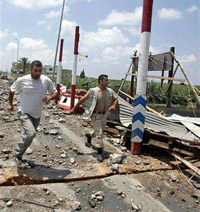“This kind of massive evacuation from Lebanon goes to show that all countries are waiting for a war,” said head of the Russian Trade and Industry Committee Yevgeni Primakov. According to him, Tel Aviv is no longer fighting against terrorism.
Israel’s fight against “Hizballah” (“Allah’s party” in Arabic) has turned into a war. As for Bush’s recent announcement, claiming that the “world must focus on “Hizballah” and Syria, as well as the isolation of Iran”, makes Primakov predict that this conflict will include other countries as well.
“We must stop the war immediately,” he said and added that the only way to prevent the future events in Lebanon would be to have the UN peacekeeping forces enter the region.
It’s not clear as to how long the disarmament of “Hizballah” and the eventual elimination will take. Some politicians say that Bush has suggested that Israel “end” the conflict in a week, but the Israeli army claims that it can fully eliminate “Hizballah” in 10-15 days.
The U.S. Congress says that “Hamas” and “Hizballah” are the ones responsible for complicating the situation.
During an interview given to one of the leading Lebanese presses, President of Lebanon Emil Lahud had this to say to the powers of the world relying on “Hamas” and “Hizballah” for starting a war: “My people will never surrender to Nasrallah,” (leader of “Hizballah”-“168 Hours”).
I talked with scientific worker of the Arabic countries department of the Middle Eastern Sciences institute of the Armenian National Academy of Sciences and candidate of historical sciences Lilit Harutyunyan about the motives for the flow of events in the Middle East and the possible war.
According to her, the current events in Lebanon and the surrounding countries are a repetition of what happened in 1982, when Israel invaded Lebanon for the second time and seized Beirut by aggression. The only difference is that the armed soldiers of “Hizballah” weren’t the ones fighting against Israel in South Lebanon, but rather the Palestinian groups (“Hizballah” hadn’t been founded yet).
“Today, Israel’s target is “Hizballah”, based in South Lebanon with its military structures. “Hizballah” was founded in the summer of 1982 in the Bekaa valley and one of the major goals of this organization is to resist the Israeli aggression.
“Hizballah” is a Shiite organization mainly sponsored by Iran and Syria. Based on the Tayif agreement signed in 1989, which put an end to the civil war in Lebanon, “Hizballah” was the only organization, which took advantage of Syria’s support, kept its army and entered the political field of Lebanon.
“Hizballah” considered South Lebanon as its zone of influence and started fighting against Israeli troops in the country in the mid-1980s. The problem is that only in 1985 was Israel forced to partially remove its troops from Lebanon. But it kept some troops in the 10-kilometer “security zone” located on the Israel-Lebanon border. However, in 2000, the Israeli government was forced to take all of its troops out of Lebanon due to the ongoing conflicts with “Hizballah” and the peaceful settlement.”
Based on the 15.59 resolution of the UN Security Council passed in 2004, all military troops in Lebanon had to be disarmed (hinting “Hizballah”) and the Syrian troops allocated since 1976 had to be removed. After the assassination of Raffik Harry, the Syrian military troops were forced to leave Lebanon by May 2005 due to pressure by the international community.
According to Lilit Harutyunyan, in contrast to the calls for unity in the Middle East, the Middle Eastern countries currently can’t play any constructive role in Lebanon and stabilize the situation.
“Lebanon is one of the largest trade centers in the Middle East. It’s natural to see Israel and other Middle Eastern countries “envy” Beirut, which managed to successfully get back on its feet after the long civil war. The fact that Lebanon is a “Middle Eastern Switzerland” has turned that country into an offshore zone where you can see Saudi, Iranian and other financial resources flowing into the country.”
It’s assumed that after this, the West will add more pressure to the countries sponsoring “Hizballah”-Syria and Iran. The two are indirectly tied to the Lebanese crisis.
According to the Arabic department expert, the U.S. is planning to instill regimes in the “Great Middle East” “democratically”. Thus, the U.S. must do that with the help of Israel-its only ally in the Middle East. It’s evident that Israel’s invasion on Lebanon and the ongoing bombings are not only against “Hizballah” because targeting “Hizballah” first and foremost weakens Lebanon, as well as allows the international community to pressure Iran and Syria.
As always, we see the clash of interests of regional countries and foreign powers in Lebanon.

